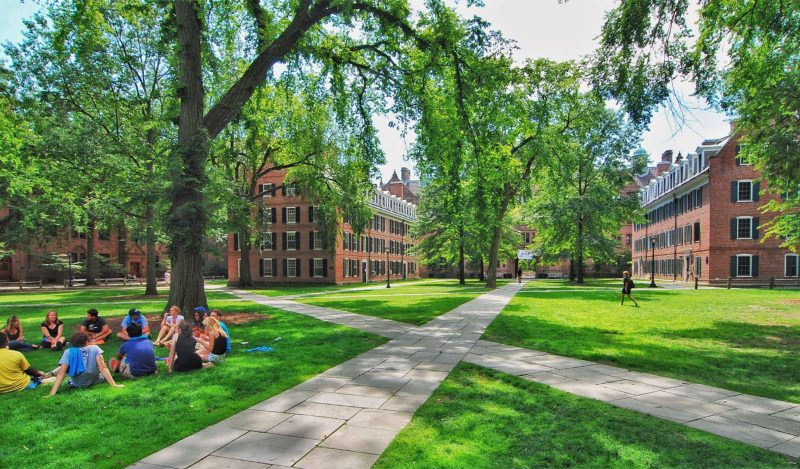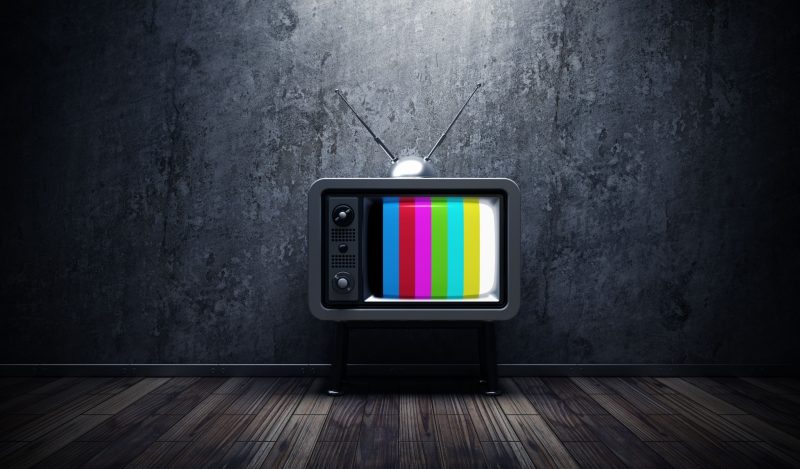It was the semester of Fall 2021 at the school of my dreams, the University of Connecticut (UConn). I purchased my textbooks, paid my tuition, and prepared myself to be a diligent and motivated student like many others who looked forward to embarking on their college education. Little did I know, I was about to have my dreams shattered: $23,000 of the merit scholarships I earned were canceled, I was refused class registration and canceled from my chosen university, and my academic statuses vanished — all because I believe in freedom of choice.
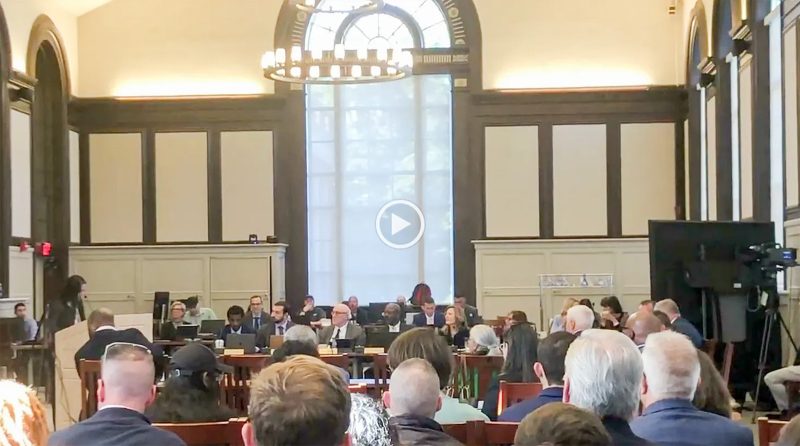
I was accepted to UConn when I was 16 years old, after dual-enrolling in 8 courses at 4 Connecticut universities and colleges as part of my homeschool education. I had graduated high school just months prior to my acceptance. While at UConn, I earned my place as a repeat on the Dean’s List, a 2021 Babbidge Scholar (top 5% of my entire college), and an Honors Scholar. I took part in 3 internships, 1 research fellowship, and was part of 2 scholarly cohorts as a freshman at UConn. I was fascinated by my pre-dental studies and completely enthralled by this college experience – until it crumbled.
When the COVID-19 vaccine was released, I was hesitant to accept such a novel treatment permanently into my body. CNN wrote, “Past vaccine disasters show why rushing a coronavirus vaccine now would be ‘colossally stupid’”, and WebMD reminded us of “What Happened Other Times a Vaccine Was Rushed?” .
No matter how great the messaging for a product – there’s always a chance of it being recalled from the market or heavily scrutinized (think: the opioid crisis, Vioxx, and the Tylenol Autism Lawsuit). Besides, neither I nor anyone I was in close contact with was a high risk individual and I took responsibility to regularly practice preventative measures.
So I applied and was granted a “non-medical” vaccine exemption. One of the notices on my exemption acceptance letter was, “Surveillance testing recommended”.
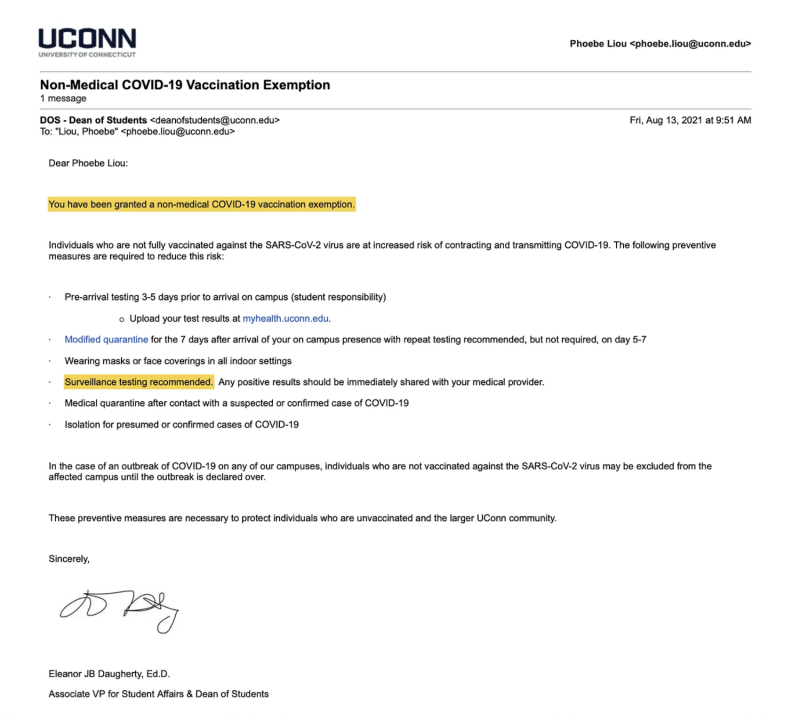
Yet just 5 weeks after the approval of my exemption, emails from UConn appeared in my inbox related to UConn’s COVID-19 policy, as shown in the image below. Since I had only agreed to the recommendation of surveillance testing, I believed these emails to be inapplicable to me. Besides, one of my classes conflicted with the testing time, therefore I wasn’t able to physically go to the testing location. However, mid-semester I learned that my “non-compliance” led to a hold on my student account that prevented me from registering for next semester’s courses.
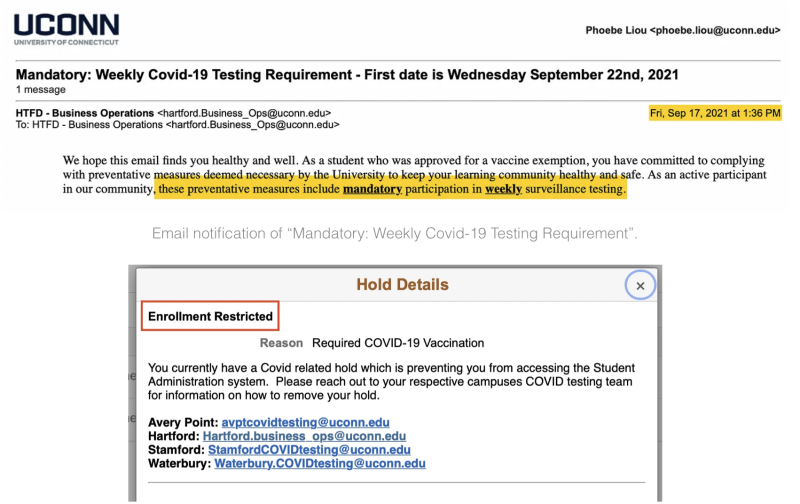
Despite alarm bells ringing in my head, I sat in class each week – helpless against the student account hold. The dissonance was misery-inducing. Until, a lucky break: my professor came down with a cold and canceled class.
It was a chance to make this a win-win situation by getting tested and have the hold lifted, without losing points towards my grade. I leapt at the opportunity and headed to their testing center to get a COVID-19 test… at least, that’s what I was expecting to receive. As I held the testing kit UConn provided, my stomach did a flip. On the packaging, it spelled out in print: “Innovative DNA Collection Devices… For research use only… Not for use in diagnostic procedures”.
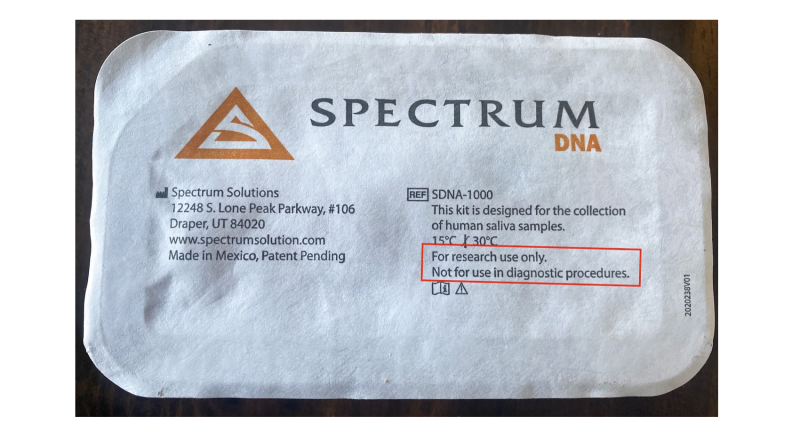
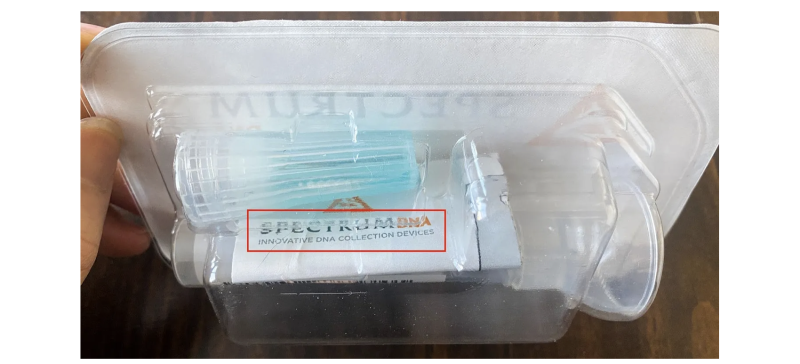
I stood there for a minute and mulled the facts in my head. I would not be providing a saliva sample solely for a COVID-19 test, rather, I would be giving my unique genetic material to research. That begged the question, “what research?”, and without knowing the answer, “how could I provide my consent – and in an ethical manner?”
“Although it may be appropriate to consult family members or community leaders, no individual capable of giving informed consent may be enrolled in a research study unless he or she freely agrees.”
—Article 25, World Medical Association (WMA)’s Declaration of Helsinki, a statement of ethical principles for medical research involving human subjects, including research on identifiable human material and data.
Thinking that “there should be other tests out there that aren’t so weird,” I looked at the options available at my local CVS and purchased a swab test. I thoroughly examined it – and made sure to look up all the text on the package, as the one UConn provided had already left a bad enough impression on me. But instead of “collecting DNA”, this test had “EO” written on the swab packaging. With a simple search online, I realized that all testing swabs contain ethylene oxide (EO), a carcinogenic substance classified by Cancer.gov and the US Environmental Protection Agency (EPA).
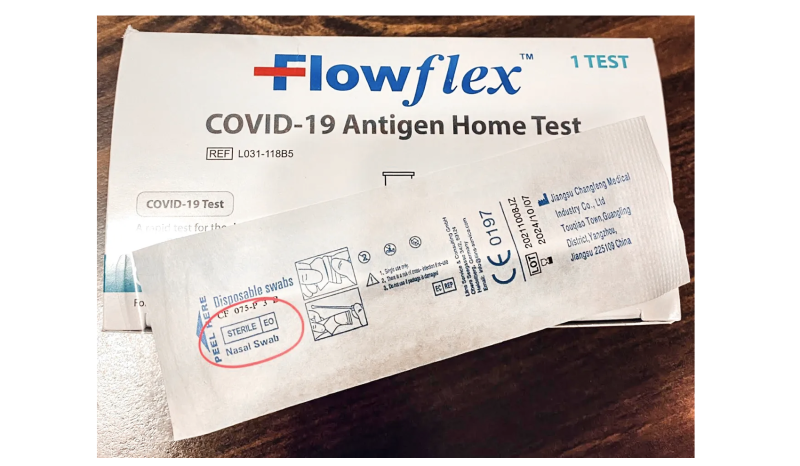
EO is a sterilizing agent, although safe with limited exposures, “can leave a residue on the devices being processed”. The EPA states that it has an estimated half-life of 69-149 days in air and 12-14 days in water. One can consider the potential effects of repeated exposure (such as weekly testing) to EO residue at the rate of its half-life.
The EPA provides that, at best, exposure to EO increases risk of acute symptoms such as nausea, vomiting, neurological disorders, bronchitis, pulmonary oedema, and emphysema. At worst, EO increases risk of lymphoma cancers, myelomas, leukaemias, breast cancer, is mutagenic, and may even lead to death.
Extremely surprised at these preliminary findings, I began researching the scientific and legal bases behind mandating COVID-19 testing. I gathered 34 documents in a matter of weeks and narrowed it down to the 10 most important sources. Citing these sources from the FDA, CDC, WHO, Universal and Federal laws, I wrote letters to our administration requesting an exemption for the COVID-19 test.
I did this on the same basis as the COVID-19 vaccine, as both are under Emergency Use Authorization (EUA) – and as such I have the legal option to accept or deny administration of such products, including the COVID-19 test as stated by the US Federal Law, FDA and CDC guidelines.
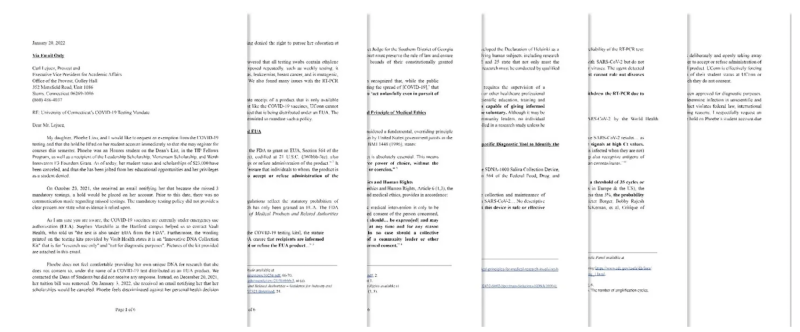
My requests were rejected, ignored and ultimately denied by the following: UConn’s Provost and Executive Vice President for Academic Affairs, Associate Vice President and Dean of Students, Executive Director of Student Health and Wellness, Director of Clinical Data Analytics & Health Information, and others in administration. My last correspondence to Susan Onorato, Executive Director of Student Health and Wellness, was met with silence.
“Any preventive, diagnostic and therapeutic medical intervention is only to be carried out with the prior, free and informed consent of the person concerned, based on adequate information. The consent should…bet express[ed] and may be withdrawn by the person concerned at any time and for any reason without disadvantage or prejudice…In no case should a collective community agreement or the consent of a community leader or other authority substitute for an individual’s informed consent.”
—Article 6 (1,3), UNESCO Universal Declaration on Bioethics and Human Rights, the first document to set global standards in biological and medical ethics.
On January 28th, 2022, I was “canceled from the University”. On January 31st, 2022, $23,000 of the merit scholarships I earned were officially canceled, as per the below email.
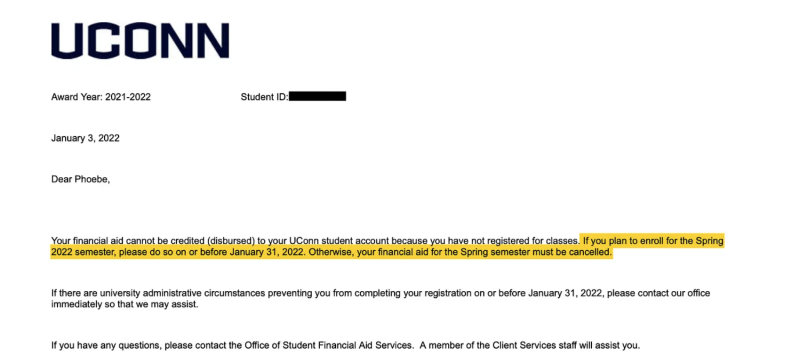

As of the date of this article, the hold that caused my cancellation is still on my account. I have been corresponding with numerous administrators and even spoke before the President and the Board of Trustees on September 28, 2022, yet all have remained silent with no indication of resolution.
This University, which once gave me hope and passion to fulfill my dreams, crushed me. I have felt rejected, isolated, and alone – no longer being in close contact with the multitude of networks and friends I made in college. I miss studying with my classmates and the immense support from my mentors, advisors, and professors.
When I was canceled from UConn, I was in the middle of writing a neurosurgery research journal article and my participation was abruptly stopped. I was planning to study abroad in my junior year, which would have been this year. I looked forward to entering dental school and eventually opening a dental practice. I made a choice for my body – and my college life was interrupted indefinitely.
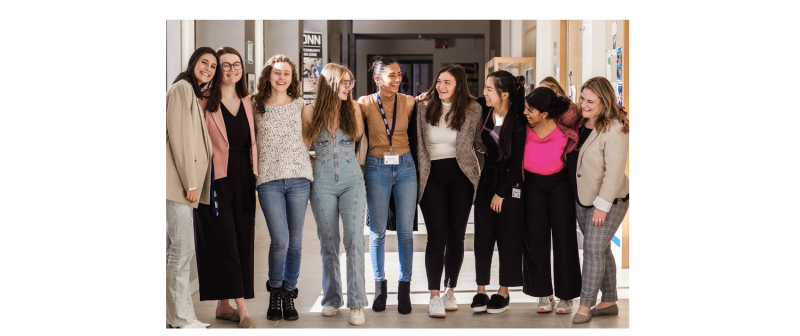
Unfortunately, I am not the only one who has suffered due to the COVID-19 mandates. While all other 17 Connecticut public universities and colleges have dropped their COVID-19 mandates – UConn is the only one still mandating. Currently, UConn students must receive the full series as well as the booster or be tagged “non-compliant”. However, for faculty and staff, the booster was never required and mandates for the initial vaccine series were “concluded” June 1st, 2022.
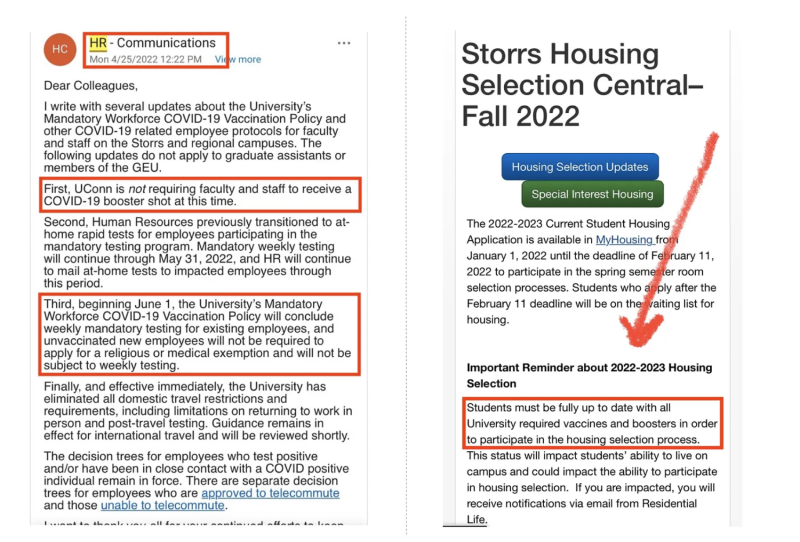
Right: External email to UConn students regarding housing.
If students receive the “non-compliant” label, they are not allowed to schedule orientation in order to register for classes, meet with advisors, use facilities on campus, and are either prevented or even removed from campus living (despite UConn’s requirement for all freshmen to dorm on-campus). In particular to campus housing, some students who received an approved “non-medical” exemption had their on-campus housing promptly canceled. Others with exemptions confirmed they were able to secure on-campus housing. It is clear UConn’s policy is NOT consistently applied to students requesting exemption.
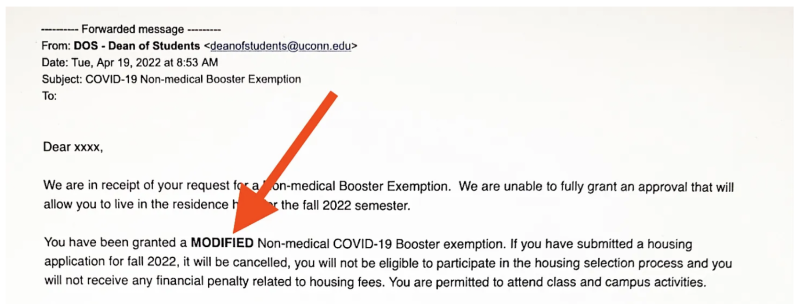
The bottom line: upload your vaccination papers, or be exempt but still restricted.
The caveat is, the process to obtain an exemption is confusing and maze-like, as expressed by students. UConn’s “non-medical” request form links directly to a religious exemption form. Further, it causes significant confusion that the medical exemption form does not include the COVID-19 vaccine.
Instead of consulting their primary care doctor, students are being cornered into accepting medical decisions made in the interest of “public health” while those who mandate these COVID-19 treatments are not intimately aware of each individual’s previous medical history, nor able to provide an individualized treatment plan afterwards.
If a student decides to make their own choice of not receiving the COVID-19 vaccines – once-in-a-lifetime college experiences are withheld from them.
While UConn proudly states they represent “diversity and inclusivity,” the minority of exempted students are held to egregious conditions. As the CDC now states, both the vaccinated and unvaccinated are at equal risk of contracting COVID-19, why does UConn not treat both groups equally?
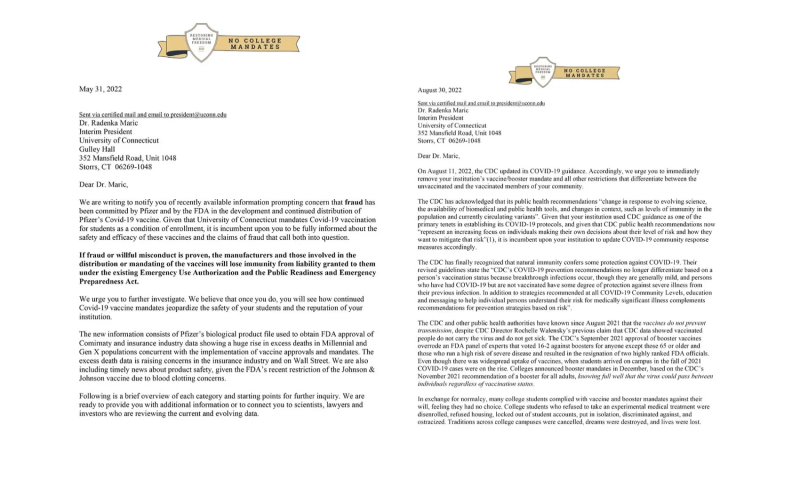
Certified letters dated May 22nd, 2022, and August 31st, 2022, were addressed to the President, CT Governor Lamont’s Designee Representative, and Board of Trustees urging them to reconsider the COVID-19 mandates and their implications on students. These letters were signed upon receipt – to date, UConn has not responded.
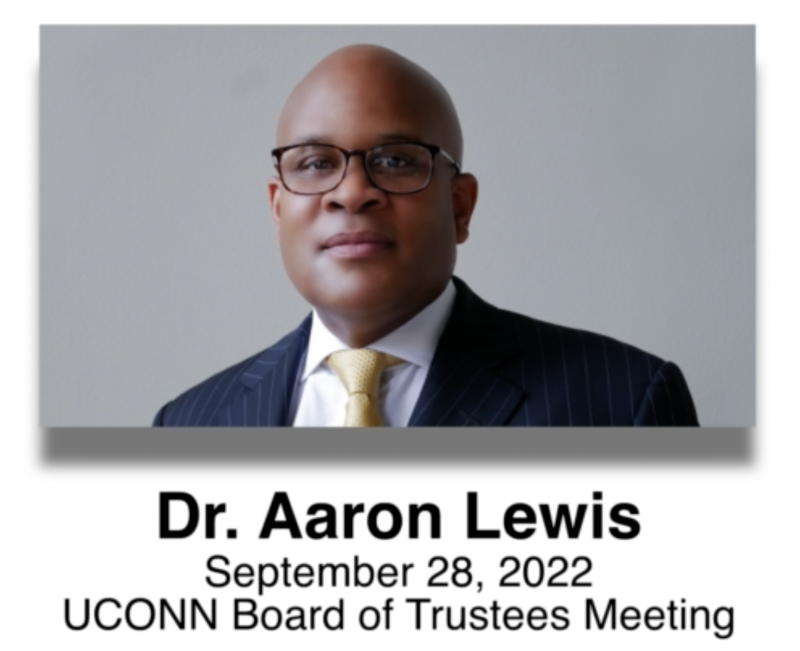
As Dr. Aaron Lewis asked at the September 28th Board of Trustees Meeting, will UConn’s decisions result in a version of Little Rock Nine, not based on race but based on health choices? Is this discrimination, but in a different gift wrap?
I posed my own question to the Board of Trustees at the September 28th board meeting, “How many more dreams will it take until you turn your ear to our voices? When will you reconsider these mandates, and accept these exempted students, and treat them like any other university students?”
Injustice anywhere is a threat to justice everywhere. ~ Martin Luther King Jr.
The University of Connecticut was my top choice. I thought my dream of dentistry would flourish in an institute renowned for its science, research, and innovation, and I also valued their progressive movement towards diversity, inclusion, and equal opportunity. Instead, I was met with silence when I asked for help and eventually kicked to the side of the road — all because I stood firm in my belief: freedom of choice.

While I have only spoken about UConn, similar situations are taking place in higher education institutions nationwide. My hope is that this story sheds light on the discrimination many students are currently facing across the country, as what administrators decide now sets precedence for students in the future.
If you have questions or a story to share, please reach out to UConn Families for Medical Freedom Group: uconnffmf@gmail.com.
Published under a Creative Commons Attribution 4.0 International License
For reprints, please set the canonical link back to the original Brownstone Institute Article and Author.
